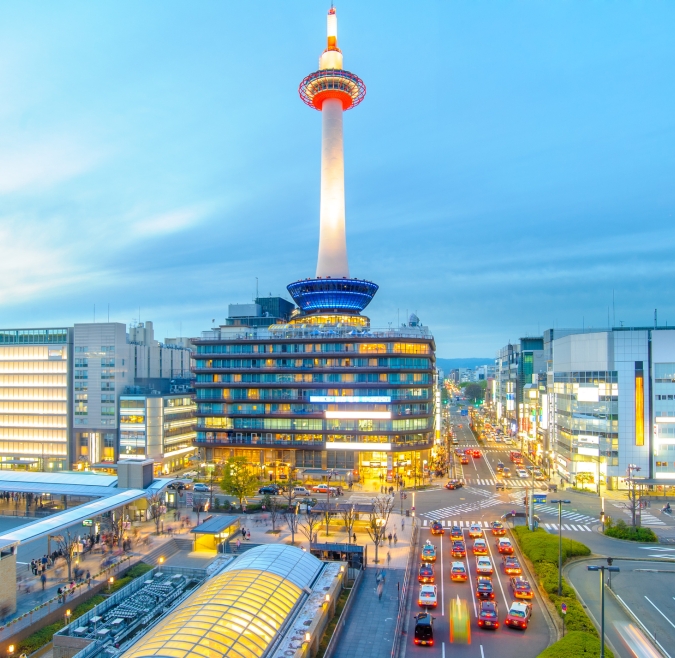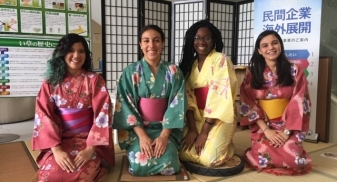Ritsumeikan University (Japan)
The Program
Offering a robust student life program alongside a strong practice of cultural traditions, Ritsumeikan has the right blend of contemporary and historical - just like the city of Kyoto
Ritsumeikan University was accorded university status in 1922. Today, it has a student population of approximately 34,000. The university is one of the most international of Japan’s universities, with a global network of exchange programs. At Ritsumeikan, you’ll be joining students from around the world in the Study in Kyoto program. This one or two-semester-long program focuses on Japanese language, traditional arts, and culture. SKP students are encouraged to take part in extracurricular activities. With over 700 student-run clubs to choose from at RU, it is likely that every SKP student will be able to find his or her niche. Clubs range from traditional arts, such as Japanese drumming, martial arts, pottery, and Noh theater, to academics and sports.
Program Locations

Japan
Kyoto
Kyoto was Japan’s capital for more than 1,000 years, and it’s still considered the spiritual and cultural center of Japan. The city brings together all the best elements of Japan, both ancient and modern. Here you will find the famous weeping cherry trees and Kabuki Theater, as well as an abundance of Buddhist temples, Shinto shrines, and Zen gardens. Modern Kyoto has a population of 1.5 million. Its economy is based on IT and other hi-tech industries—Nintendo has its headquarters here—as well as more traditional products like sake and kimonos.
Academics
In order to have an idea of what classes are available, you should visit the Ritsumeikan University website.
You will be part of Ritsumeikan University’s special program for international students known as the Study in Kyoto Program (SKP). The program is specifically designed for the study of Japanese language and culture. You will be placed into one of five levels of core curriculum based on your Japanese proficiency. To determine the appropriate level, you will take a placement exam during your orientation in Japan. Each level focuses on three aspects of language study: Reading Writing Comprehension.
For information about Study Abroad credit transfer, registration, and transcripts please visit the Academics section of our website.
Housing and Meals
University housing at Ritsumeikan cannot be guaranteed. If you are not offered university housing, it will be your responsibility to find appropriate housing for the duration of the study abroad program (in most cases all spring semester students will be responsible for finding their own housing. Academic year students may or may not be responsible depending on the number of applicants for that year). We do have some information on off-campus housing in our office, so feel free to stop by to learn more. We will notify you as soon as possible about your prospects for university housing.
Some academic year students will be offered university housing in either International House I or the International House II (known as I-House 1 and I-House 2), or in apartments secured by Ritsumeikan. These are off-campus residence buildings located approximately 15-25 minutes by foot from campus. Japanese students, as well as students from all over the world, live in these buildings. They both have single rooms with shared bath and kitchen facilities. Kitchens have a gas stove, microwave, refrigerator and cooking utensils. Bed linens, pillows and a blanket will be provided, but you should bring your own bath towels. Internet access is available via communal computers or via LAN from each room.
During university breaks, you may stay in your room; however, some services may not be available during this time. Staying in your room before and after official program dates is not possible. In order to learn more about I-House 1 and 2, please visit the Ritsumeikan web page.
Financial Information
Program Costs
| NJ Residents | Non-NJ Resident | |
|---|---|---|
| ATW Program Cost* | $11,000 | $15,200 |
Program Cost includes:
• Tuition
• Administrative Fees
• Emergency Medical Access Abroad
• *Access the World (ATW)
Out-of-Pocket Costs
| Housing | $2,500 |
| Meals | $2,500 |
| Airfare | $1,500 |
| Local Transportation | $400 |
| Visa | $50 |
| Books and Classroom Materials | $200 |
| Japanese Health Insurance | $100 |
| Personal Expenses | $1,500 |
| Total | $8,750.00 |
Out-of-Pocket Cost includes:
The above costs are estimations and represent the known out-of-pocket costs students encounter during their time abroad.
Some of these expenses will be paid for prior to going abroad, such as an airline ticket and visa costs, while some of these expenses, such as meals and local transportation, will be paid in-country as part of your daily expenses. As you plan, you will need to budget these costs and spend wisely throughout your time abroad.
Program Costs
| NJ Residents | Non-NJ Resident | |
|---|---|---|
| ATW Program Cost* | $11,000 | $15,200 |
Program Cost includes:
• Tuition
• Administrative Fees
• Emergency Medical Access Abroad
• *Access the World (ATW)
Out-of-Pocket Costs
| Housing | $2,500 |
| Meals | $2,500 |
| Airfare | $1,500 |
| Local Transportation | $400 |
| Visa | $50 |
| Books and Classroom Materials | $200 |
| Japanese Health Insurance | $100 |
| Personal Expenses | $1,500 |
| Total | $8,750.00 |
Out-of-Pocket Cost includes:
The above costs are estimations and represent the known out-of-pocket costs students encounter during their time abroad.
Some of these expenses will be paid for prior to going abroad, such as an airline ticket, while some of these expenses, such as meals and personal expenses, will be paid in-country as part of your daily expenses. As you plan, you will need to budget these costs and spend wisely throughout your time abroad.

